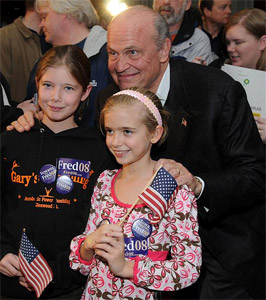Political Socialization
How do we learn acquire our political preferences? Political scientists call the process political socialization. As we get older, our political orientations become more stable and resistant to change.
Most of this learning takes place through an informal process. Yes, by taking this class, you are engaging in a formal political socialization process, but you did not arrive at this class without picking up, absorbing and acquiring some political preferences from your family and the media.

Several factors contribute to political socialization. Where a person lives geographically, the surrounding local and cultural community, and family income, all play an important part in political socialization. Socialization happens in many stages generally starting at the family level, followed by public schooling, and culminating in the ever present mass media.
Family attitudes, traditional values, presence of religion, and the degree that a family discusses political issues, all influence the adolescent belief system at home. How much time a family spends outside might influence whether or not public land issues play an important part in an individual’s political ideas.
Public schools also contribute greatly to the socialization of personal political thought. Many schools require the daily pledge of allegiance to the United States flag, and a flag is present in every classroom. Political history, memorization of the constitution, and knowledge of the historical struggle for freedom are also forms of political socialization taking place at the public school level.
Mass media, which is present at every level of socialization, greatly impacts political perception. Newspapers, television programs, magazines, and radio shows all convey different political view points and information, influencing how the political environment is perceived.